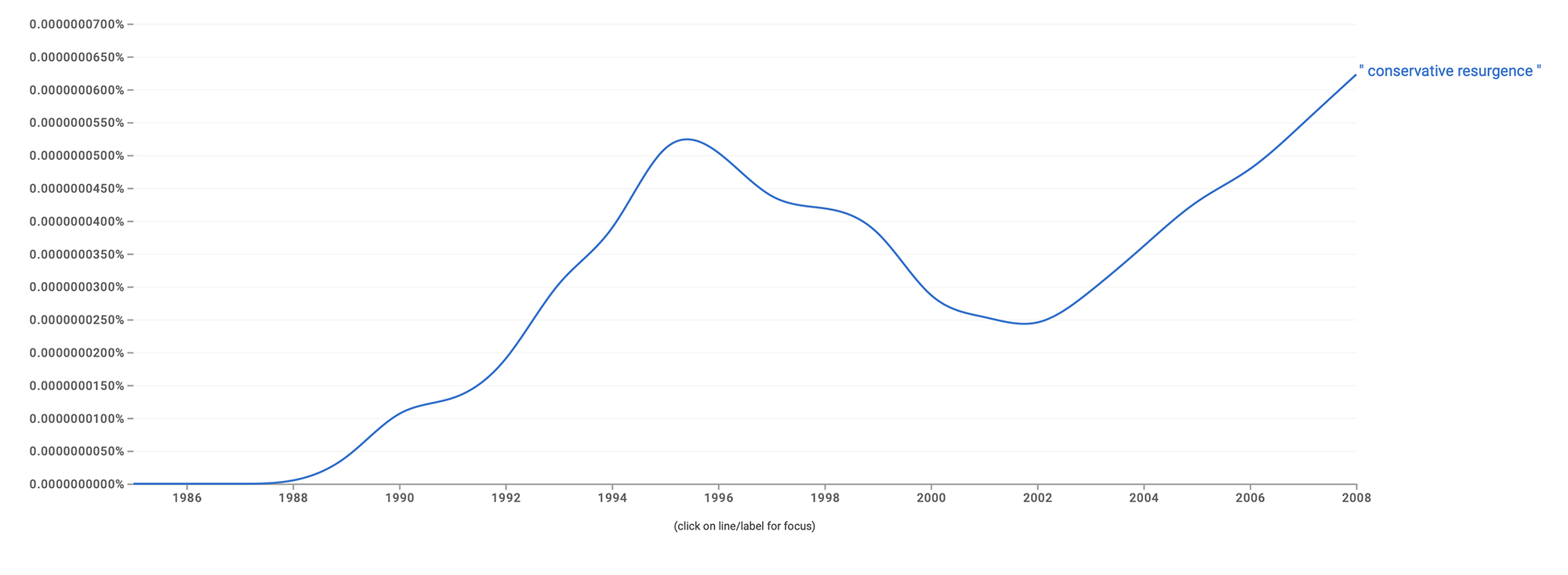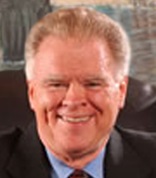A few months ago, a former colleague published a video blog in which he confessed he fears he accidentally coined the term “conservative resurgence” in the Southern Baptist Convention.
That sent me digging into the depths of the internet and my own bookshelves to see if I could confirm his suspicion.
One thing I can now say for sure is that Dave Parker, former assistant editor of the Oklahoma Baptist Messenger, can lay down the burden of thinking he was the first person to use the moniker insiders now use without limit to describe what happened to the SBC from 1979 to 2000. He may have inadvertently advanced its usage, but it turns out the term was in use before he thought it was.
But exactly where this term originated isn’t as easy to identify.
A TikTok confession
To get to the bottom of this, let’s start with Parker’s confession, from his TikTok video blog dated Oct. 29, 2024. And by way of explanation about how small even the SBC can be, I need to note that Parker married a woman I knew as a fellow student at Oklahoma Baptist University whose good friend — and I think maybe even roommate — is a longtime friend and colleague of mine, Sarah Zimmerman, who left the Baptist Messenger staff to join me on the news staff at the SBC Home Mission Board in 1990.
Here’s how Dave Parker tells the story: “On July 23, 1990, I replaced Sarah Zimmerman, who had moved to the Home Mission Board, now known as the North American Mission Board in Atlanta. The editor, the associate editor and two assistant editors met every week to determine what news stories would be carried in the newspaper and to discuss any potential problems. We were working on the August 30, 1990, issue and editor Glenn A. Brown had a concern.
“Zimmerman had a story about a new group called the Baptist Cooperative Missions Program Inc. that was a way for moderate Southern Baptists to fund missions programs without going through the SBC. Brown had a very real conundrum. He had longtime friendships with most of the leaders who were now deemed ‘moderates.’ He liked them and didn’t want to offend them. However, conservatives were now in charge and if he wanted to remain editor of the Messenger he had to please them as well. He was walking a real tightrope all the time.
“Brown knew the story Zimmerman had written was important and we needed to publish it. His main concern, though, was the following paragraph. It read: ‘Those attending the meeting claim that they have been cut off by the fundamentalist takeover that has changed the makeup of the denomination’s boards and agencies over the past 12 years.’ Brown didn’t like the words ‘fundamentalist’ or ‘takeover’ because of their negative connotations.
“There was, in fact, a well-orchestrated takeover of the SBC planned and executed by Criswell College President Paige Patterson and Houston judge Paul Pressler but the fundamentalists didn’t like for it to be called a ‘takeover.’
“We sat in the Messenger library for several hours discussing how to reword Zimmerman’s article and not offend the people who signed the checks. Brown liked to talk everything out loud, so he constantly threw out different ideas. … After several hours, I had had enough. I just wanted to do my job and not spend any more time fretting over two words in an article. Finally, out of frustration, I said, ‘Why don’t we just call it a “conservative resurgence”? That gets the point across and shouldn’t offend anybody. Brown seemed startled. He thought about it, ruminated on it and said, ‘Yes, I think that would work. Let’s go with that.’
“In that article, we put ‘conservative resurgence’ in quotes but the quotes soon disappeared in later articles. I never thought that a phrase that I blurted out in a moment of frustration would gain such traction, but ‘conservative resurgence’ is the term now used everywhere to describe the fundamentalist takeover of the Southern Baptist Convention and it morphed into a term about the changes in the Republican Party that began with Ronald Reagan as well.”
Digging deeper
When I first listened to Parker’s vlog, his reasoning made sense. The timing seemed right, and the circumstances were plausible. But before writing about it, I wanted to make sure there wasn’t more to the story. Two months later, I know more than I did but less than I want to. (Keep reading, because I’m going to ask for your help at the end.)
The first place I turned for research was Google. There’s a nifty thing called Google NGram Viewer that searches a database of millions of published books for certain words and phrases. I entered a search for “conservative resurgence” and learned there were no published uses of this term until 1988.
In 1988, the phrase was used in the context of international politics in a book titled The Resurgence of Conservatism in Anglo-American Democracies, written by Barry Cooper, Allan Kornberg and William Mishler.
It also was used in a 1988 book titled Canada at the Polls, 1984, written by Howard Rae Penniman.
 But according to Google NGram, the first published book usage of “conservative resurgence” in a Southern Baptist context happened in 1991 in James Hefley’s book, The Conservative Resurgence in the Southern Baptist Convention.
But according to Google NGram, the first published book usage of “conservative resurgence” in a Southern Baptist context happened in 1991 in James Hefley’s book, The Conservative Resurgence in the Southern Baptist Convention.
This was the sixth and final book in a series written by Hefley, who was a favorite author of SBC conservatives for documenting the events of the denomination in a way they liked. The entire series was called “The Truth in Crisis.”
According to Google, this sixth book “has also been called the ‘The Missing Volume.’ Fewer copies of this volume were printed than any of the other five volumes which have remained in print over the years. Many consider this volume a collector’s item. Hefley described volume six as the wrap-up book of ‘The Truth in Crisis’ series. It covers 70 years of eventful Southern Baptist history, culminating in the most revolutionary change of a denomination in American church history.”
If Hefley’s 1991 usage was the first book reference to the term, then maybe Dave Parker was right about his coinage a year earlier.
Baptist Press archives
Still curious, I searched the archives of Baptist Press, kept by the Southern Baptist Historical Library. And what to my wondering eyes should appear but a byline by my dear friend and colleague Marv Knox dated Feb. 29, 1988.
He was then features editor at Baptist Press and wrote a news article about SBC seminary presidents being upset about Samford University in Birmingham, Ala., starting a new seminary, Beeson Divinity School. While the SBC seminary presidents opposed the alternative training ground for ministers, a famous figure who was not yet an SBC seminary president offered a more sanguine response.
Here’s the direct quote from the BP story: “’I am not surprised they are doing it,’ said Paige Patterson, president of Criswell College in Dallas and a leader in the recent SBC conservative resurgence.”
As far as I can tell, that is the first published reference to a “conservative resurgence” in the SBC. And it was more than two years before Parker sat around a conference table in Oklahoma City and uttered his suggestion in frustration.
To Parker’s credit, it’s obvious this term was not in wide usage until 1990 and later. Archival searches at Baptist Press and through Google NGram show a steady increase in usage from 1990 to 1995, which is the NGram peak until a new resurgence of the term took hold in 2002 and accelerated until 2008.
Baptist Press had a second usage of the term just three weeks after the first appearance in Knox’s article, on March 18, 1988. This time, the author was Stan Hastey, then Washington bureau chief for BP. The story was about Charles Fuller, chairman of the SBC Peace Committee.
The lead in that article stated: “The Southern Baptist Convention Peace Committee needs an alteration in the course that over the last decade has led to a conservative resurgence, the chairman of the SBC Peace Committee said.”

Daniel Vestal (right) congratulating Morris Chapman, who defeated him in the race for SBC president in 1990. (Southern Baptist Historical Library and Archives)
For a minute, I thought perhaps Morris Chapman coined the phrase — and he still could have — but the first written usage of the term by Chapman, who then was pastor of First Baptist Church in Wichita Falls, Texas, and a candidate for the SBC presidency, occurred on Feb. 16, 1990.
An article written by Dan Martin, news editor at BP, stated: “The Texas pastor commented the ‘conservative resurgence is still in progress and must continue if we expect to have an ongoing impact for Christ upon this world. Once we are more settled on the issue of the Bible, I expect us to become one of the most exploding forces for Christ across this land and around the world.’”
By the way, all these usages predate publication of Hefley’s sixth and final volume about the SBC. And best I can tell, Hefley did not use the phrase in his first five books. It suddenly appears at the title of his sixth book in 1991.
Asking a veteran religion writer
To check on this, I turned to another veteran religion reporter, Louis Moore, who now lives near me in the Dallas area. In 1999, Louis and Kay Moore bought Hannibal Books from Hefley and continued to sell his books.
From 1972 to 1986, Louis Moore was religion editor at the Houston Chronicle and was on the front lines of covering the SBC battles. From 1984 to 1986, he served as president of Religion Newswriters Association.
Like me, he affirmed his memory that “conservative resurgence” was not an early term used in the SBC’s Battle for the Bible. All of us working journalists at the time struggled to find neutral terms to describe the combatants.
“In the early days (1979 and thereafter) I was using the terms ‘ultra-conservatives’ and ‘fundamentalists’ alternately. The expression ‘fundamentalist takeover’ was a natural derivation of the term fundamentalists and dates to 1979 or early 1980,” he said.
“I know the term was in widespread verbal usage by the mid to late 1980s even if not in written documents.”
“Dating the usage of the term ‘conservative resurgence’ to 1990 cannot be correct because I know the term was in widespread verbal usage by the mid to late 1980s even if not in written documents.
“Early on, W.C. Fields (vice president at the SBC Executive Committee) and Baptist Press lobbied for the terms ‘ultraconservatives’ and ‘conservatives,’ while Pressler and his allies argued for the terms ‘conservatives’ and ‘liberals.’ Likewise, one side called the movement ‘fundamentalist takeover’ while in reaction to that term the other side eventually called it ‘the conservative resurgence.’
“The term ‘fundamentalist takeover’ came first and the term ‘conservative resurgence’ later as a reaction to the earlier term.”
That jives with my own memory of the term “conservative resurgence” emerging as the preferred term favorable to the victors in the battle. It perfectly embodies two key virtues of the movement: the belief that the Pressler-Patterson coalition represented the true conservatives and that what they were doing was indeed a “resurgence,” an attempt to take the SBC back to its prior conservative roots.
I’ve talked to several SBC insiders from the conservative movement, and thus far no one has a memory of any single point of origin. Thus, it seems likely to me that the term might have had multiple points of origin over a few years.
The search is not over
It’s not far-fetched to image how Dave Parker believed he coined the phrase out of thin air. As I’ve documented, the term had appeared in at least three Baptist Press articles prior to his epiphany. So it’s possible those references had lodged in the back of his head and then came forth at the moment of need.
My own memory is of despising the term from the first time I heard it, as it sounded to me like historical revisionism and giving the “fundamentalists” the high ground. But as these “fundamentalists” or “ultraconservatives” or “fundamental-conservatives” or “conservatives” continued to rack up wins, they got to write the book and tell the stories.
That culminated in a history written by Jerry Sutton in 2000, The Baptist Reformation: The Conservative Resurgence in the Southern Baptist Convention.
The term is so ubiquitous in the SBC today that it has its own abbreviation: CR. That’s ultimate insider language.
Our digging on this origin story isn’t done, however. Ben Cole and I would like to talk about this more on an upcoming episode of our podcast, “Stuck in the Middle with You.”
If you have specific memories or documentation of this term prior to 1990, we’d like to hear from you. Send me an email here.
Mark Wingfield serves as executive director and publisher of Baptist News Global. He is the author of Honestly: Telling the Truth About the Bible and Ourselves and Why Churches Need to Talk About Sexuality. His brand-new book is Troubling the Truth and Other Tales from the News.





